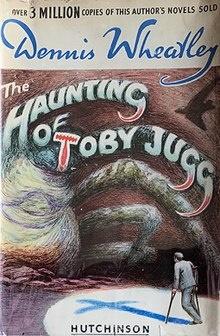Book review by George S: The premise of this story is a gripping one: During the Second World War, Toby Jugg, a fighter-pilot, crashes and is paralysed from the waist down. He is being looked after in a country house in Wales, under the care of Helmut, a teacher from his old school. The book is the diary he keeps recording his experiences – a journal he began when he suffered from visions of a horrible beast trying to get into his bedroom window at night. When it comes to this kind of nastiness, Wheatley is pretty good at conjuring horror:
my flesh creeps anew from the positive knowledge that it is activated by one single, all-absorbing thought—the urge to wrap itself about my body, suck out my soul and destroy me utterly.

Gradually Jugg comes to suspect that he is the victim of a plot to drive him mad before he comes into his inheritance an his twenty-first birthday, and that the apparently benevolent Helmut is the prime mover of it. Helpless because of his disability, he tries increasingly desperate stratagems to improve his situation, but is countered at every step.
The plot thickens, and the book becomes increasingly lurid. as we learn that Helmut’s motives are not just financial the man is the kingpin of a malevolent organisation of Black Magicians who plot to use the Jugg millions to take control of Britain. The conspiracy theory becomes increasingly lurid, and less and less believable. If I’d not been reading this book for the group I would probably not have finished it.
The real problem is that Wheatley can’t stop himself from giving vent to all of his own political beliefs and prejudices. Reading the book is rather like being buttonholed by a saloon-bar bore. A progressive free school probably based on A.S. Neill’s Summerhill? It’s the front for a conspiracy of devil-worshippers of course. A Jewish refugee from the Nazis ? A Communist, obviously, with plans to infiltrate and subvert the British Labour party. The Communists are solely dedicated to the crushing of the British spirit of freedom – but they in turn are merely puppets of the Satanists. There is a long prophecy of the economic destruction that a Labour government would wreak in Britain.
Racial stereotypes abound:
he is a typical Slav; big, fair and boisterous, with a hearty laugh that deceives people, until they come to know him well and find out how cunning he is below the surface. He is cruel, too…
and
one of those thin-faced, brainy Jewesses who are not given to laughter and consider that ‘Life is real, life is earnest’.
The book is fairly well-constructed, if you can bear its implausibilities and prejudices. Wheatley uses the diary form well – one day’s entry is full of hope as the hero thinks up a new scheme to outwit his persecutors; the next entry starts in despair, with those hopes shattered. This pattern gets repeated endlessly, though. Generally Wheatley’s prose style is ponderous – though admittedly the narrative does speed up in the last few chapters when (spoiler alert) the Giant Spider arrives, and the meeting of the evil coven is destroyed by a mighty flood.. Before that the book could have done with ruthless editing. There is a long section, for example, where one character expounds befiefs about reincarnation that have little to do with the rest of the book.
In 2006 the BBC broadcast The Haunted Airman, a rather stylish and atmospheric adaptation of the book, with most of the nonsense and prejudice taken out. The crucial story of the 300-page book is told in just over an hour, with an economy of story-telling that Wheatley seems incapable of.
